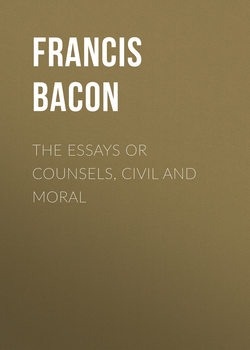The Essays or Counsels, Civil and Moral

Реклама. ООО «ЛитРес», ИНН: 7719571260.
Оглавление
Francis Bacon. The Essays or Counsels, Civil and Moral
Of Truth
Of Death
Of Unity In Religion
Of Revenge
Of Adversity
Of Simulation And Dissimulation
Of Parents And Children
Of Marriage And Single Life
Of Envy
Of Love
Of Great Place
Of Boldness
Of Goodness and Goodness Of Nature
Of Nobility
Of Seditions And Troubles
Of Atheism
Of Superstition
Of Travel
Of Empire
Of Counsel
Of Delays
Of Cunning
Of Wisdom For A Man's Self
Of Innovations
Of Dispatch
Of Seeming Wise
Of Friendship
Of Expense
Of the True Greatness Of Kingdoms And Estates
Of Regiment Of Health
Of Suspicion
Of Discourse
Of Plantations
Of Riches
Of Prophecies
Of Ambition
Of Masques And Triumphs
Of Nature In Men
Of Custom And Education
Of Fortune
Of Usury
Of Youth And Age
Of Beauty
Of Deformity
Of Building
Of Gardens
Of Negotiating
Of Followers And Friends
Of Suitors
Of Studies
Of Faction
Of Ceremonies, And Respects
Of Praise
Of Vain-glory
Of Honor And Reputation
Of Judicature
Of Anger
Of Vicissitude Of Things
Of Fame
Отрывок из книги
The fruits of unity (next unto the well pleasing of God, which is all in all) are two: the one, towards those that are without the church, the other, towards those that are within. For the former; it is certain, that heresies, and schisms, are of all others the greatest scandals; yea, more than corruption of manners. For as in the natural body, a wound, or solution of continuity, is worse than a corrupt humor; so in the spiritual. So that nothing, doth so much keep men out of the church, and drive men out of the church, as breach of unity. And therefore, whensoever it cometh to that pass, that one saith, Ecce in deserto, another saith, Ecce in penetralibus; that is, when some men seek Christ, in the conventicles of heretics, and others, in an outward face of a church, that voice had need continually to sound in men's ears, Nolite exire,—Go not out. The doctor of the Gentiles (the propriety of whose vocation, drew him to have a special care of those without) saith, if an heathen come in, and hear you speak with several tongues, will he not say that you are mad? And certainly it is little better, when atheists, and profane persons, do hear of so many discordant, and contrary opinions in religion; it doth avert them from the church, and maketh them, to sit down in the chair of the scorners. It is but a light thing, to be vouched in so serious a matter, but yet it expresseth well the deformity. There is a master of scoffing, that in his catalogue of books of a feigned library, sets down this title of a book, The Morris-Dance of Heretics. For indeed, every sect of them, hath a diverse posture, or cringe by themselves, which cannot but move derision in worldlings, and depraved politics, who are apt to contemn holy things.
As for the fruit towards those that are within; it is peace; which containeth infinite blessings. It establisheth faith; it kindleth charity; the outward peace of the church, distilleth into peace of conscience; and it turneth the labors of writing, and reading of controversies, into treaties of mortification and devotion.
.....
Concerning those that are more or less subject to envy: First, persons of eminent virtue, when they are advanced, are less envied. For their fortune seemeth, but due unto them; and no man envieth the payment of a debt, but rewards and liberality rather. Again, envy is ever joined with the comparing of a man's self; and where there is no comparison, no envy; and therefore kings are not envied, but by kings. Nevertheless it is to be noted, that unworthy persons are most envied, at their first coming in, and afterwards overcome it better; whereas contrariwise, persons of worth and merit are most envied, when their fortune continueth long. For by that time, though their virtue be the same, yet it hath not the same lustre; for fresh men grow up that darken it.
Persons of noble blood, are less envied in their rising. For it seemeth but right done to their birth. Besides, there seemeth not much added to their fortune; and envy is as the sunbeams, that beat hotter upon a bank, or steep rising ground, than upon a flat. And for the same reason, those that are advanced by degrees, are less envied than those that are advanced suddenly and per saltum.
.....